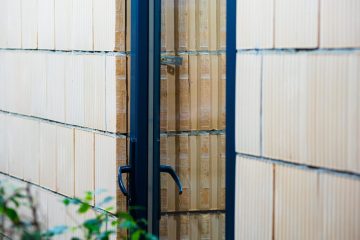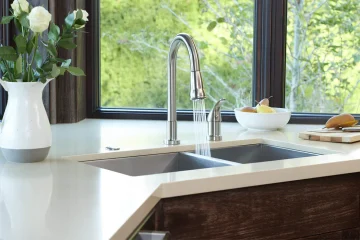Installing whole house water filtration systems improves household water quality. These systems remove chemicals, minerals, and other contaminants from water, making it cleaner and softer. When you install water purifiers or undersink drinking water system, you’re contributing to your overall health and sustainable water practices. Here are some ways whole house filtration systems influence sustainability:
Reduce Plastic Consumption
A whole house water filtration system eliminates purchasing water in single-use containers. Limiting the number of plastic water containers also reduces the amount of fossil fuels required to produce the plastics. These efforts help minimize the harmful byproducts of plastic manufacturing and contaminate our air and water. In these ways, installing water filters contributes to the health of the atmosphere, environment, and other natural resources.
Conserve Water
If you live in an area with hard water or sediment in your plumbing, installing filtration systems eliminates the need to run the tap to flush out contaminants. Whole house filtration systems connect to the water main of the property, producing clean water for every faucet and fixture in the home. This gives you and your family access to safe, clean water for drinking, cooking, cleaning, and bathing. In addition to purification, some filtration devices recycle used water for reuse in toilets and irrigation systems. Recycling is an effective method for preventing excess water waste and conserving natural resources.
Protect Appliances and Pipes
Home appliances like dishwashers, refrigerators, and washing machines become more efficient without sediment and mineral deposits buildup. Water filters help your home appliances use less water and last longer. This reduces the number of appliances in landfills, protecting the environment and saving you money over time. Filtration systems also keep the pipes in your home free from hard water deposits and sediment buildup. These deposits can cause damage like corrosion and rust over time. Corrosion may lead to leaks in the pipes, reducing water pressure and wasting water. Installing a water purification system at the main line minimizes plumbing damage and water loss, contributing to conservation efforts.
Remove Added Chemicals
Your local water treatment plant may use disinfectant chemicals like chlorine to kill bacteria and viruses. After cleaning the water, these facilities aim to remove most disinfectant chemicals before sending water to city residents. Despite these efforts, treated water may still have a chemical taste or smell. A home filtration system will remove the traces of disinfectant chemicals the treatment plant couldn’t, improving the quality of your water without adding more harmful chemicals. Many household filters use carbon, gravel, salt, and resin beads to draw harmful elements from the water. This creates safer water for you and your family to drink, cook, and bathe with. It also reduces the amount of wastewater contaminants returning to natural water sources.
Types of Whole House Water Filtration Systems
The type of water filtration system you need depends on the water quality in your area. A water treatment company can test your water to determine the levels of chemicals and metals in your water and suggest the most effective system. Some water filtration systems use activated carbon filters to attract and filter out materials like chlorine, iron, and hydrogen sulfide that affect the water’s taste and smell. In reverse osmosis systems, water pressure moves water through a semi-permeable filter. This helps remove dissolved contaminants. Ion exchange systems move water through a bed of resin beads coated in charged ions. These ions replace calcium and magnesium ions to produce softer, cleaner water.
Hire a Water Treatment Professional
If you want to conserve natural resources and improve the water in your home, look for a residential water treatment company. An experienced water treatment company will provide system recommendations, install the filter, and perform regular maintenance. They’re also qualified to assess city and well water to identify potential issues. Contact a water filtration professional today to schedule a free test and learn more about getting clean, soft water in your home.




